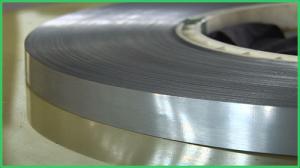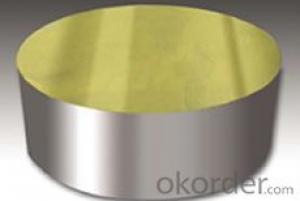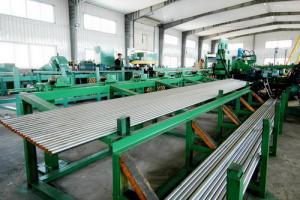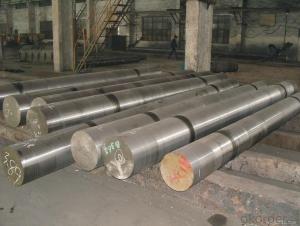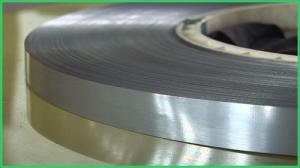Spring Steel Round Bar Hot Rolled
- Loading Port:
- China Main Port
- Payment Terms:
- TT or LC
- Min Order Qty:
- -
- Supply Capability:
- -
OKorder Service Pledge
OKorder Financial Service
You Might Also Like
Product Description:
OKorder is offering Spring Steel at great prices with worldwide shipping. Our supplier is a world-class manufacturer of steel, with our products utilized the world over. OKorder annually supplies products to European, North American and Asian markets. We provide quotations within 24 hours of receiving an inquiry and guarantee competitive prices.
Product Applications:
For manufacturing all kinds of flat spring or round spring with small sections, clockwork spring,
Product Advantages:
OKorder's Spring Steel are durable, strong, and resist corrosion.
Main Product Features:
· Premium quality
· Prompt delivery & seaworthy packing (30 days after receiving deposit)
· Corrosion resistance
· Can be recycled and reused
· Mill test certification
· Professional Service
· Competitive pricing
Product Specifications:
-Material: 70Si2CrA
-Production: Hot rolled or cold rolled
-Standard: GB/T·5218-1999
-Type: Spring Steel
-Alloy or no: Alloy
Chemical Composition:
C | Mn | Si | Cr |
0.65~0.75 | 0.40~0.60 | 1.40~1.70 | 0.20~0.40 |
S | P | Ni | |
≤0.030 | ≤0.030 | ≤0.030 |
FAQ:
Q1: Why buy Materials & Equipment from OKorder.com?
A1: All products offered byOKorder.com are carefully selected from China's most reliable manufacturing enterprises. Through its ISO certifications, OKorder.com adheres to the highest standards and a commitment to supply chain safety and customer satisfaction.
Q2: How do we guarantee the quality of our products?
A2: We have established an advanced quality management system which conducts strict quality tests at every step, from raw materials to the final product. At the same time, we provide extensive follow-up service assurances as required.
Q3: How soon can we receive the product after purchase?
A3: Within three days of placing an order, we will begin production. The specific shipping date is dependent upon international and government factors, but is typically 7 to 10 workdays.
Images:
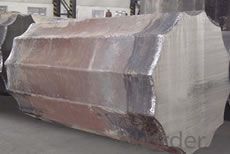
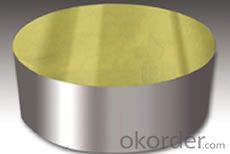
- Q:How is weathering steel used in outdoor structures?
- Weathering steel, also known as corten steel, is commonly used in outdoor structures due to its unique properties. It forms a protective rust-like surface when exposed to the elements, which acts as a natural barrier against further corrosion. This makes it highly resistant to rust and erosion, making it ideal for outdoor structures such as bridges, sculptures, architectural facades, and retaining walls. Additionally, weathering steel is aesthetically pleasing and requires minimal maintenance, making it a popular choice in various outdoor applications.
- Q:What are the different construction grades of special steel?
- There are several different construction grades of special steel, including but not limited to ASTM A36, ASTM A572, ASTM A514, and ASTM A588. These grades vary in their mechanical properties and are specifically designed to meet different construction requirements, such as strength, durability, or corrosion resistance.
- Q:How does special steel contribute to reducing product costs while maintaining quality?
- Special steel contributes to reducing product costs while maintaining quality through various ways. Firstly, special steel offers higher strength and durability, allowing manufacturers to create lighter and more efficient designs. This reduces material usage and transportation costs while maintaining the desired product performance. Additionally, special steel's exceptional corrosion resistance minimizes the need for expensive protective coatings or frequent maintenance, saving on long-term costs. Its superior heat resistance also enables manufacturers to use less energy during production processes, resulting in reduced operational expenses. Furthermore, special steel's unique properties, such as high machinability and formability, enhance manufacturing efficiency. This leads to reduced production time, lower labor costs, and increased overall productivity. Overall, the use of special steel in product manufacturing optimizes cost-efficiency without compromising quality, making it an indispensable material for many industries.
- Q:What is the role of research and development in advancing special steel technology?
- The advancement of special steel technology relies heavily on research and development (R&D). Special steel, which refers to steel alloys with enhanced properties like high strength, corrosion resistance, heat resistance, or electrical conductivity, benefits greatly from R&D efforts. R&D activities are crucial for pushing the boundaries of special steel technology and creating new and improved alloys. Scientists and engineers continuously research and explore new compositions, manufacturing processes, and heat treatment techniques to enhance the properties and performance of special steels. One of the primary roles of R&D in advancing special steel technology involves discovering and developing new alloy compositions. R&D teams analyze the properties of different elements and their interactions to design steel alloys with desired characteristics. Through experiments and testing, they optimize the alloy to meet specific application requirements and enhance properties like strength, hardness, toughness, or other desirable traits. Additionally, R&D focuses on developing innovative manufacturing processes for special steel production. Techniques such as vacuum melting, rapid solidification, or powder metallurgy are employed to achieve a refined microstructure and improved mechanical properties. R&D teams work on optimizing these processes to enhance the overall quality, efficiency, and cost-effectiveness of special steel production. R&D also plays a crucial role in improving heat treatment techniques for special steels. Heat treatment is a critical step in fabricating special steels as it helps achieve desired microstructures and properties. R&D endeavors to optimize heat treatment parameters like temperature, time, and cooling rates to enhance the mechanical properties and performance of special steels. Furthermore, R&D contributes to the development of new testing and characterization methods for special steels. This enables the evaluation and validation of properties and performance under various conditions. Advanced techniques like electron microscopy, X-ray diffraction, and mechanical testing are employed to assess microstructural features, phase transformations, and mechanical behavior. Overall, R&D activities are indispensable for advancing special steel technology. Through continuous research, innovation, and optimization, R&D teams contribute to the development of new and improved alloys, manufacturing processes, heat treatment techniques, and testing methods. This ultimately leads to the advancement of special steel technology and its applications in industries like automotive, aerospace, energy, and construction.
- Q:What are the properties of aluminum alloys?
- Aluminum alloys possess a wide range of desirable properties such as high strength-to-weight ratio, excellent corrosion resistance, good thermal conductivity, and electrical conductivity. They also exhibit good formability, allowing for a variety of manufacturing processes such as extrusion, casting, and machining. Additionally, aluminum alloys can be easily joined using various welding techniques, making them versatile materials for numerous applications in industries such as aerospace, automotive, construction, and consumer goods.
- Q:What are the applications of special steel in the railway industry?
- Special steel has various applications in the railway industry, primarily due to its exceptional strength, durability, and resistance to extreme conditions. It is commonly used in the manufacturing of railway tracks, ensuring their longevity and ability to withstand heavy loads and frequent train traffic. Special steel is also employed in the production of railway wheels and axles, providing enhanced wear resistance and improved performance. Additionally, it is utilized in the construction of railway bridges and tunnels, where its high tensile strength and corrosion resistance are crucial for maintaining structural integrity and safety.
- Q:How does special steel contribute to the defense aerospace industry?
- Special steel plays a critical role in the defense aerospace industry by providing the necessary strength, durability, and resistance to extreme conditions that are essential for the design and production of military aircraft and defense systems. One of the key contributions of special steel is its ability to withstand high temperatures and pressures, making it suitable for the construction of engine components such as turbine blades, exhaust systems, and combustion chambers. These parts are subjected to intense heat and stress during operation, and special steel ensures they can withstand these extreme conditions without compromising performance or safety. Furthermore, special steel is utilized in the manufacturing of structural components in military aircraft, such as landing gear, wings, and fuselage sections. These components need to possess exceptional strength and toughness to withstand the harsh conditions encountered during flight and combat operations. Special steel provides the necessary mechanical properties to ensure these components can withstand the forces and impacts they may experience. Another crucial aspect where special steel contributes to the defense aerospace industry is its corrosion resistance. Military aircraft are often exposed to harsh environments, including saltwater and corrosive chemicals. Special steel, through the addition of corrosion-resistant alloys, helps protect critical parts from corrosion, ensuring the longevity and reliability of the aircraft. Moreover, special steel's high strength-to-weight ratio allows for the production of lightweight yet robust components in defense aerospace applications. This characteristic is highly desirable in the aerospace industry as it enables the design of aircraft that are more fuel-efficient, faster, and capable of carrying higher payloads. By reducing weight, special steel contributes to the overall performance and efficiency of military aircraft. In conclusion, special steel is an indispensable material in the defense aerospace industry. Its unique properties, such as high temperature resistance, strength, corrosion resistance, and lightweight characteristics, enable the production of reliable, high-performance military aircraft and defense systems. Special steel plays a crucial role in ensuring the safety, efficiency, and effectiveness of the defense aerospace industry.
- Q:What are the different methods for joining special steel components?
- There are several methods for joining special steel components, including welding, brazing, soldering, and mechanical fastening. Welding involves melting the base metals and adding a filler material to create a strong bond. Brazing and soldering use a lower melting point filler material to join the components. Mechanical fastening includes methods like bolts, screws, and rivets to hold the components together. Each method has its own advantages and is chosen based on the specific requirements of the application.
- Q:Can special steel be used in the production of jewelry?
- Yes, special steel can be used in the production of jewelry. It is commonly used in industrial and contemporary jewelry designs due to its durability, strength, and unique aesthetic appeal. However, it is less commonly used in traditional or fine jewelry where precious metals like gold and silver are preferred.
- Q:Can special steel be welded?
- Yes, special steel can be welded.
1. Manufacturer Overview |
|
|---|---|
| Location | |
| Year Established | |
| Annual Output Value | |
| Main Markets | |
| Company Certifications | |
2. Manufacturer Certificates |
|
|---|---|
| a) Certification Name | |
| Range | |
| Reference | |
| Validity Period | |
3. Manufacturer Capability |
|
|---|---|
| a)Trade Capacity | |
| Nearest Port | |
| Export Percentage | |
| No.of Employees in Trade Department | |
| Language Spoken: | |
| b)Factory Information | |
| Factory Size: | |
| No. of Production Lines | |
| Contract Manufacturing | |
| Product Price Range | |
Send your message to us
Spring Steel Round Bar Hot Rolled
- Loading Port:
- China Main Port
- Payment Terms:
- TT or LC
- Min Order Qty:
- -
- Supply Capability:
- -
OKorder Service Pledge
OKorder Financial Service
Similar products
New products
Hot products
Related keywords
